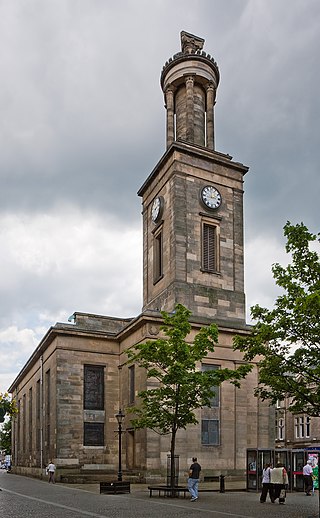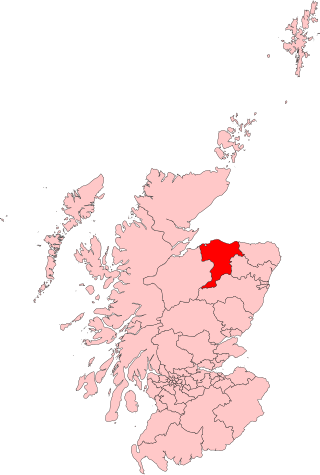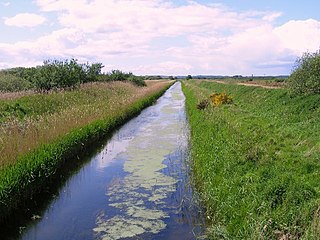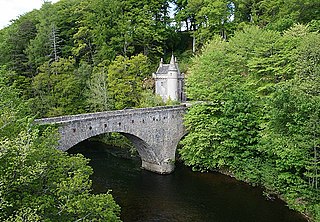
Landshut Bridge is a road bridge in Elgin, Moray, Scotland which crosses the River Lossie. The bridge is named after Landshut in Bavaria, Germany, a twin town of Elgin. [1] [2]

Landshut Bridge is a road bridge in Elgin, Moray, Scotland which crosses the River Lossie. The bridge is named after Landshut in Bavaria, Germany, a twin town of Elgin. [1] [2]

The bridge was designed as part of the Elgin Flood Alleviation Scheme as a replacement for Pansport Bridge, which was in the same location. Landshut Bridge is longer and has an additional span in order to cross a second channel of the River Lossie added as part of the flood alleviation project. [3]
Construction began in 2011. A temporary bridge was installed adjacent to the construction site to allow Pansport Bridge to be demolished and Landshut Bridge to be constructed. [4] The bridge was completed in July 2014. [5]
The bridge is 75 metres (246 feet) long and has two spans. The deck is cable-suspended. The main contractor was Morrison Construction and the steelwork was erected by the Cleveland Bridge & Engineering Company. [5] [4] [6]

The River Ness is a river in Highland, Scotland, UK. It flows from Loch Dochfour, at the northern end of Loch Ness, north-east to the mouth of the Beauly Firth at Inverness, a distance of about 6 miles, with a fall in height of about 16 metres. The river is the origin of the name of Inverness, which is from Scottish Gaelic: Inbhir Nis, meaning "Mouth of the Ness".

Elgin is a historic city and formerly a royal burgh in Moray, on the North Coast of Scotland. It is the administrative and commercial centre for Moray. The town originated to the south of the River Lossie on the higher ground above the floodplain where the town of Birnie is. There, the church of Birnie Kirk was built in 1140 and serves the community to this day.

Lossiemouth is a town in Moray, Scotland. Originally the port belonging to Elgin, it became an important fishing town. Although there has been over 1,000 years of settlement in the area, the present day town was formed over the past 250 years and consists of four separate communities that eventually merged into one. From 1890 to 1975, it was a police burgh as Lossiemouth and Branderburgh.

Grampian was one of nine former local government regions of Scotland created in 1975 by the Local Government (Scotland) Act 1973 and abolished in 1996 by the Local Government etc. (Scotland) Act 1994. The region took its name from the Grampian Mountains.

Forres Mechanics Football Club are a senior Scottish association football club from the town of Forres, Moray, currently playing in the Highland Football League. They play at the town's Mosset Park. Forres Mechanics are the oldest association football club in the North of Scotland and are one of only two original teams to play in the Highland League since its first season in 1893, the other being Clachnacuddin.

Rothes is a town in Moray, Scotland, on the banks of the River Spey, 10 miles (16 km) south of Elgin. The town had a population of 1,252 at the 2011 Census. A settlement has been here since AD 600.

Moray is a county constituency of the House of Commons of the Parliament of the United Kingdom. It elects one Member of Parliament (MP) by the first past the post system of election.

The River Lossie is a river in north east Scotland. The river originates in the hills above Dallas, in Moray, and has its source 400 metres (1,300 ft) above sea-level. It enters the sea at Lossiemouth on the Moray Firth. By the time it moves through Elgin its rate of flow, in normal conditions, is best described as very slow. The gradient between Elgin and Lossiemouth is almost imperceptible with a total fall of less than 5 metres (16 ft).

The Morayshire Railway was the first railway to be built north of Aberdeen, Scotland. It received royal assent in 1846 but construction was delayed until 1851 because of the adverse economic conditions existing in the United Kingdom. The railway was built in two phases with the section from Elgin to Lossiemouth completed in 1852. When the Inverness and Aberdeen Junction Railway (I&AJR) reached Keith via Elgin, the Morayshire was able to complete the Speyside second phase by connecting the Craigellachie line at Orton. Initially, the Morayshire ran its own locomotives on the I&AJR track between Elgin and Orton but this was short-lived and the Morayshire carriages were then hauled to Orton by the I&AJR. Disagreements with the I&AJR eventually forced the Morayshire into constructing a new section of track between its stations at Elgin and Rothes; this was completed in 1862. The Morayshire accomplished its final enlargement by connecting to the new Great North of Scotland Railway (GNoSR) Craigellachie station in 1863. Crippling debt forced the company into an arrangement with the GNoSR for it to assume operation of the track in 1866. By 1881, the Morayshire had greatly reduced its liabilities and its long-sought-after amalgamation with the GNoSR finally took place.
The Muckle Spate was a great flood in August 1829, which devastated much of Strathspey, in the north east of Scotland. Muckle is a Scots word for 'much' or 'great'.

Spynie Canal is a canal in Moray, Scotland, which lies between Elgin and Lossiemouth. It drains into the River Lossie near its mouth at Lossiemouth.

Aberlour distillery is a Speyside single malt Scotch whisky distillery, in Aberlour, Strathspey, Scotland, at the confluence of the Lour Burn and River Spey near Ben Rinnes.

The Bridge of Avon is a bridge over the River Avon at Ballindalloch in Moray, Scotland, built between 1800 and 1801 by George Burn. The bridge is mainly rubble-built, with an abutment on the south bank, and a pier with a cutwater on the north bank, of tooled ashlar. It crosses the river in a single wide segmental arch, with a smaller flood arch on the north bank.

The Carron Bridge is a bridge at Carron in Moray, Scotland, which crosses the River Spey between the parishes of Knockando and Aberlour. It was built for the Strathspey Railway in 1863, to a design by Alexander Gibb, an engineer for the Great North of Scotland Railway, and fabricated by the iron founders William McKinnon and Co. It originally carried both the railway and a roadway, but the railway has now closed.

The Old Spey Bridge is a footbridge on the outskirts of Fochabers in Moray, Scotland, which formerly carried the main road between Inverness and Aberdeen over the River Spey. Originally built between 1801 and 1806 by George Burn, it was partially destroyed in the Muckle Spate of 1829, with two of its arches being washed away. Archibald Simpson repaired the bridge in 1831 with a single timber span, which was reconstructed in cast iron in 1853. The bridge is designated a Category A listed building.

The Victoria Bridge is a suspension footbridge near the village of Aberlour in Moray, Scotland. It was built in 1902, replacing a ferry that had previously been in service there, and is now a Category A listed building.

Cloddach Bridge is a road bridge south of Elgin that crosses the River Lossie.
The East Beach Bridge is a footbridge which crosses the River Lossie and connects Lossiemouth to the East Beach. The present bridge was opened in 2022 and replaced an older structure.

Arthur's Bridge is a road bridge in Moray, Scotland which carries the B9103 road across the River Lossie.
Bishopmill Bridge is a road bridge in Elgin, Moray, Scotland.